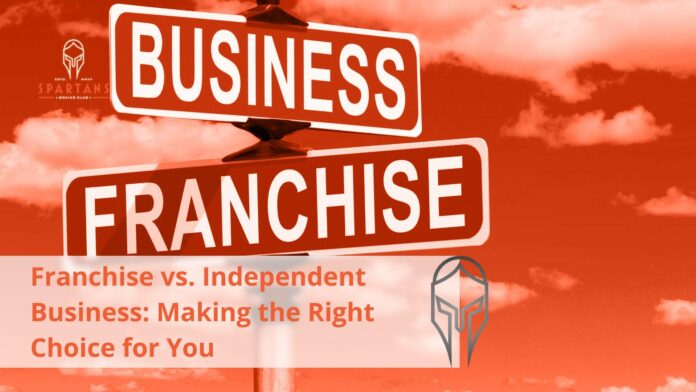Introduction
Entrepreneurship offers individuals the opportunity to pursue their business ideas and build successful ventures. When embarking on an entrepreneurial journey, aspiring business owners often face the decision of whether to start an independent business or opt for a franchise model. In this article, we will explore the characteristics, advantages, and considerations of both franchise and independent startup models to help entrepreneurs make informed decisions about their entrepreneurial path.
Franchise Model: The Power of Established Brands
Franchising involves entering into a contractual agreement with an established brand to operate a business using its proven business model, trademarks, and support systems. Here are some key aspects of the franchise model:
Access to Established Brand and Support Systems
One of the primary benefits of choosing the franchise model is the immediate access to an established brand with a recognized reputation. Franchisees benefit from the brand’s existing customer base, marketing strategies, and operational processes. The franchisor provides ongoing support, training, and guidance to ensure the success of the franchisee.
Proven Business Model and Reduced Risk
Franchise systems come with a proven business model that has been tested and refined over time. This reduces the risk associated with starting a business from scratch. Franchisees can leverage the franchisor’s experience and expertise to navigate challenges and make informed decisions.
Marketing and Advertising Support
Franchise systems often have comprehensive marketing and advertising programs in place. Franchisees can benefit from national or regional marketing campaigns, access to marketing materials, and brand recognition. This can significantly help in attracting customers and establishing a foothold in the market.
Independent Startup: The Freedom of Creativity and Flexibility
Starting an independent business allows entrepreneurs to build a venture from the ground up, offering them complete creative control and flexibility. Here are some key aspects of independent startups:
Creative Freedom and Flexibility
Independent startups offer entrepreneurs the freedom to develop their unique brand identity, business model, and operational processes. Entrepreneurs can pursue their creative ideas and bring their vision to life without any constraints imposed by a franchisor.
Full Ownership and Decision-Making Control
Independent startups provide entrepreneurs with full ownership and control over all aspects of their business. They have the freedom to make decisions regarding branding, marketing strategies, product offerings, and operational procedures. This level of autonomy allows entrepreneurs to adapt quickly to market changes and implement innovative approaches.

Higher Profit Potential
While independent startups require significant effort and investment, they also offer higher profit potential compared to franchises. As the sole owner of the business, entrepreneurs can retain all profits generated by the venture, rather than sharing them with a franchisor. However, it is important to note that the level of profitability depends on various factors, including market conditions and the entrepreneur’s business acumen.
FAQs (Frequently Asked Questions)
Q: What are the upfront costs associated with starting a franchise?
A: The upfront costs of starting a franchise vary depending on the brand and industry. Franchisees typically pay an initial franchise fee, which grants them the right to operate under the brand name. Additional costs may include equipment, inventory, leasehold improvements, and ongoing royalty fees. It is important to thoroughly review the franchisor’s financial disclosure documents and conduct proper due diligence before investing in a franchise.
Q: How much freedom do franchisees have in decision-making?
A: While franchisees benefit from the established systems and support provided by the franchisor, they must adhere to the franchisor’s guidelines and operating standards. Franchisees have some degree of decision-making freedomwhen it comes to local marketing initiatives, staffing, and customer service. However, major strategic decisions and brand-related matters usually require consultation or approval from the franchisor.
Q: Can independent startups compete with established franchises?
A: Yes, independent startups have the potential to compete with established franchises by offering unique value propositions, personalized customer experiences, and innovative solutions. Independent startups can leverage their agility, adaptability, and ability to differentiate themselves to attract customers. However, it requires careful market research, effective marketing strategies, and a strong value proposition to compete with the brand recognition and resources of established franchises.
Q: Are there ongoing fees or royalties for independent startups?
A: Unlike franchises, independent startups are not obligated to pay ongoing fees or royalties to a franchisor. However, independent startups have their own expenses such as marketing costs, operational expenses, rent, and utilities. These costs may vary depending on the nature of the business and its specific requirements.
Q: Which model is more suitable for first-time entrepreneurs?
A: The choice between a franchise and an independent startup depends on individual preferences, resources, and goals. Franchises provide a structured system, established brand recognition, and support, which can be beneficial for first-time entrepreneurs who want guidance and a proven business model. Independent startups, on the other hand, offer greater freedom, creativity, and potential for higher profits. It is essential for first-time entrepreneurs to carefully assess their skills, resources, and risk tolerance before making a decision.
Conclusion
Both the franchise and independent startup models offer unique advantages and considerations for entrepreneurs. Franchises provide access to established brands, proven business models, and ongoing support. On the other hand, independent startups offer creative freedom, flexibility, and the potential for higher profits. The choice between the two models depends on factors such as individual goals, resources, risk tolerance, and entrepreneurial vision.
Entrepreneurs should carefully evaluate their priorities, conduct thorough market research, and consider their long-term objectives before deciding which model best aligns with their aspirations. Ultimately, both franchise and independent startup models have the potential to lead to business success with the right planning, execution, and dedication.
============================================


